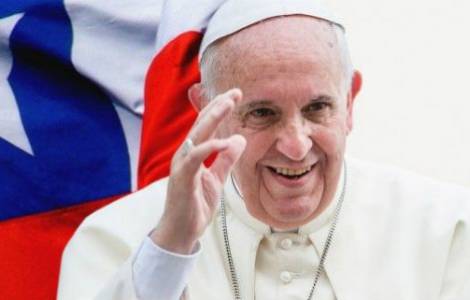
Santiago (Chile) - The visit of Pope Francis to Chile will be the first eco-socio-economically sustainable. The organizers have developed a precise strategy in this regard. Animated by the request of the Holy Father in Laudato Sì "to limit the use of non-renewable resources to the maximum, to moderate consumption, to maximize the efficiency of the use of resources, to re-use and recycle" as much as possible, five measures for environmental sustainability have been included, five more for the economic aspect and as many for the social one, with the aim of "making prudent use of natural resources and to avoid pollution in areas where mass events will take place", explains the organizing committee presenting the visit. Among the "good practices" identified there is the measurement of "carbon traces", which will be reduced and will be economically compensated, according to the law in force, with similar provisions for the reduction of waste generated, recycled and re-used where possible; and a campaign for the care of the environment, with repeated messages to remember the rational use of resources such as water, essential for the arid areas of the north, in the austral summer.
Moreover, as subsidiary material for the formation of volunteers and the adequate preparation of the pilgrims, the World Catholic Movement for Climate (a network of almost 200 ecclesial organizations of the 5 continents, among dioceses, congregations, NGOs and educational institutions) have prepared two guides for "the care of nature", where it is recommended, among other things, to use the numerous solar cell recharging towers and to try vegetarian food, since the production of meat causes more than 14% of the gas emissions greenhouse effect worldwide.
On behalf of state authorities, from an environmental point of view, pilgrims are advised to take water with them in reusable bottles (not plastic), to avoid the use of plastic bags, even in case of purchases, and to replace them with their own rucksack, to keep the waste until one finds a rubbish bin and separate them for recycling ("up to 80% of waste is recyclable"). Those present are invited to prefer public transport, also for greater efficiency in transfers to the ceremonial sites. The economic transparency in the financing and expenses of the visit will be constantly monitored, according to the Chilean law of access to public information, and information will be provided on the organization's web page www.franciscoenchile.cl. The visit will also be universally inclusive, promoting the participation - and effective access - of pilgrims and volunteers with disabilities or belonging to any minority, such as natives and immigrants. (SM) (Agenzia Fides, 16/1/2018)